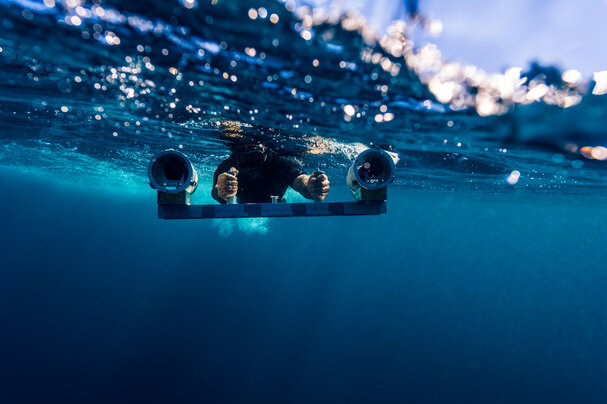
Ocean research is an area where a focus on impact appeared to improve a university's standing.
Credit: Jason Edwards/Getty
Research impact should be incorporated into projects as early as possible, EARMA conference hears.
3 May 2024

Jason Edwards/Getty
Ocean research is an area where a focus on impact appeared to improve a university's standing.
Scientists who want to secure European research funding need to co-design their projects with those who are most likely to be impacted by the results, a conference for research managers has heard.
The European Commission, which runs the €95.5 billion (US$101.5 billion) Horizon Europe research programme, increasingly wants to see evidence that the “end users” of a study’s findings were fully involved in projects, rather than research teams consisting only of academics who are operating in an “echo chamber”.
This was the advice from Emma Siddall, a research officer at Trinity College Dublin in Ireland, who was speaking at the European Association of Research Managers and Administrators (EARMA) annual conference held in Odense, Denmark, on April 23 to 25.
Siddall told a session on helping research managers and administrators (RMAs) to become ‘impact agents’ that a growing number of funders were “placing a great emphasis” on real-world impact in their award criteria.
This meant that RMAs needed to “become very skilled” in helping scientists to think about “pathways to impact” from the very beginning of the planning process for projects, Siddall said.
Although the criteria for defining impact differed between funding agencies, one method — and something used by Horizon Europe — was to use a ‘theory of change’ approach, where project leaders show how their research findings will be used by people to “effect change” in society.
Siddall explained that without this, research results might be viewed as “useless”.
“You can get all this money, you can do this work, you can publish papers, but if your end users are not taking up the results and doing something to effect change, that work is no good,” she said. “The worst case is if you plan the results not knowing what your end users need. Then you don’t have an impactful project designed in the first place.”
Siddall added that a growing expectation in Horizon Europe grants was that these end users needed to be involved in projects, too.
“Increasingly, the Commission is expecting you to take this multi-actor approach. You’re not just having a consortium of academics working together all in an echo chamber, you’re actually working with end users,” she said. “But it’s not enough to just have them in the consortium, they actually have to write the project with you and at the very beginning of the proposal planning stage.”
Rethinking collaborations
The conference session heard an example of how research managers could even play a key role as ‘impact agents’ for an entire disciplinary area by linking researchers to key groups outside academia from government, industry and the non-profit sector.
Harald Hasler-Sheetal, a former head of external relations at the University of Southern Denmark (SDU) in Odense, said that around five years ago the institution had taken the strategic decision to align itself with a Horizon Europe mission on ocean research.
“For us at SDU, this engagement wasn’t just about looking for new funding opportunities, it was actually to transform our faculty to create real-world impact,” said Hasler-Sheetal, who is now a science officer at the International Council for the Exploration of the Sea in Copenhagen.
As part of this decision, SDU appointed an “ocean mission manager”, Cecilie Peterson, who helped to create a hub in Denmark that linked SDU with other Danish universities, government ministries for fishing, agriculture and the environment, companies with commercial interests in the sea, and non-governmental organizations.
“You can imagine these are stakeholders with very opposing interests,” said Hasler-Sheetal, but through the hub they came together to “discuss solutions for the challenges that our ocean in Denmark faces”.
“Through Cecilie’s effort, SDU has markedly increased our visibility and influence as a leader in ocean research and innovation. Seven years ago, if you would have asked people in the ocean research area about SDU, none of these people would have recognized us. Today, it is a completely different picture.”
